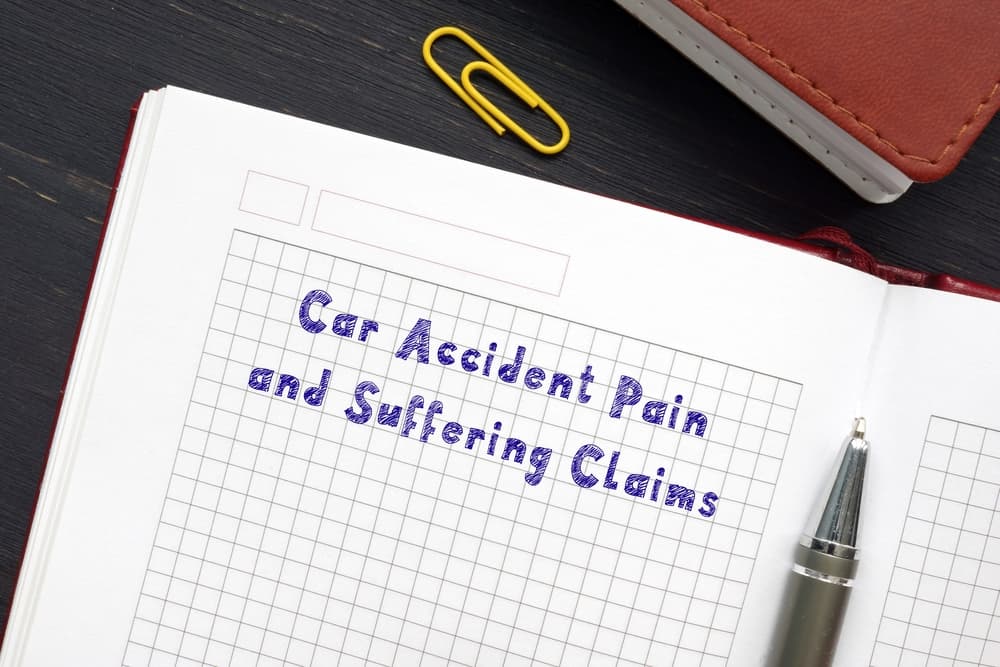
After you suffer injuries in a car accident caused by another driver’s negligence or recklessness, you may have the right to recover compensation for financial losses, such as vehicle repairs, medical expenses, and lost income or earning potential.
However, depending on the injuries you suffered in the crash, you may also have the right to pursue a financial recovery for the pain and suffering caused by the car accident and your injuries.
The compensation you may recover for pain and suffering will depend on the severity of your injuries, the prolonged or permanent effects on your life (such as physical disabilities the crash caused), and other factors.
Although insurance companies may seem reluctant to pay compensation for pain and suffering, having an experienced Bronx car accident lawyer working for you can increase the chances of a fair financial recovery when car accident injuries cause intense pain or prolonged emotional distress.
What Is Pain and Suffering?
Pain and suffering refers to a type of loss that a person can incur due to injuries suffered in a car accident. A car accident victim may recover compensation for various economic and non-economic losses sustained due to a crash.
Economic losses from a car accident can include car repair bills, reimbursement for the value of a totaled vehicle, medical expenses, costs of long-term care for disabilities, and ongoing and future income losses.
Conversely, non-economic losses include personal, subjective harm that a person endures due to accident injuries, including physical pain, emotional distress, and reduced quality of life. Lawyers frequently refer to these non-economic losses as pain and suffering.
Pain and suffering can cover various emotional and physical distress caused by a car accident, injuries, and subsequent medical care. For example, getting into a car accident can cause a person to suffer emotional trauma, such as PTSD, survivor’s guilt, or the onset of phobias.
An accident victim may also experience emotional distress from difficulties and limitations on their usual activities of daily living caused by injuries or disabilities. Accident injuries can also cause physical pain, whether from the injury or subsequent medical care (post-operative pain, for example).
Limitations imposed by injuries and disabilities can adversely affect a person’s enjoyment or quality of life.
What Factors Determine How Much Money You Can Recover for Pain and Suffering After a Car Accident?
Numerous factors can influence the amount of compensation you’re entitled to for pain and suffering in a car accident claim. Examples of factors that can determine the size of your financial recovery include:
The Severity of Your Injuries
The type and severity of injuries caused by a car accident can significantly affect the compensation you recover for pain and suffering.
Common injuries suffered by car accident victims include:
- Broken bones
- Ligament, tendon, and muscle injuries
- Whiplash
- Herniated spinal disc injuries
- Nerve damage
- Severe lacerations, abrasions, or degloving injuries
- Internal organ injuries and internal bleeding
- Traumatic brain injuries
- Traumatic limb loss
- Facial trauma
- Dental injuries
- Paralysis
The more severe your injuries, the more compensation you may recover for your pain and suffering. More severe injuries will likely cause you to feel more intense pain for longer periods.
Your injuries may also require intensive treatment and rehabilitation that may come with temporary physical pain, such as post-operative pain from surgeries to repair injuries. Severe injuries can also lead to prolonged or permanent physical disabilities, disfiguring scarring, and emotional distress.
The Duration of Your Medical Treatment and Rehabilitation
How long it takes you to reach maximum medical improvement (MMI) from accident injuries may influence the amount of your pain and suffering compensation. Maximum medical improvement occurs when additional medical intervention won’t improve your condition. You probably can’t settle your claim until you’ve reached MMI.
A person who suffers injuries in a car accident that heal within a few days or weeks may receive little or no compensation for pain and suffering. However, a person who needs months of medical care and rehabilitation to recover from injuries has a stronger case to argue that they’ve suffered significant pain or emotional distress that warrants financial compensation.
In addition, the types of medical treatment you undergo may affect your compensation. For example, you might recover more pain and suffering compensation if you need invasive surgery to repair or treat accident injuries and complications than you would if your injuries required only stitches or a cast.
Your Emotional Trauma or Distress
Evidence of emotional or mental effects from an accident or physical injuries can also help support a claim for compensation for pain and suffering.
Examples of emotional trauma or distress that may occur after a car accident include PTSD, depression, anxiety, and panic attacks. Emotional distress may arise from the accident or the injuries and disabilities caused by the accident.
How Your Injuries Affect Your Daily Life
Your testimony or testimony from family members, friends, and co-workers about how your injuries and disabilities have affected your daily living can also support a claim for compensation for pain and suffering.
You might recover more compensation if injuries or disabilities have required you to undergo physical or occupational therapy to learn adaptations for permanent impairments that interfere with daily tasks or if you need home health care or other assistance with daily living.
You might recover compensation if injuries or disabilities prevent you from participating in activities or sports you previously enjoyed. Finally, you may have a right to compensation when your injuries affect your personal relationships, including your relationship with your spouse.
Your Pre-Existing Injuries or Health Conditions
Finally, any pre-existing injuries, health conditions, or disabilities you had before the car accident may also affect your compensation for pain and suffering.
When you have experienced physical impairments or difficulties due to pre-existing injuries or degenerative changes, an insurance company or at-fault driver may argue for limiting your pain and suffering compensation to the extent to which the car accident aggravated your existing injuries or health conditions.
However, if those injuries or complications already limit your daily activities, you may have difficulty recovering pain and suffering compensation for reduced quality of life. You would have to show that the accident injuries increased the level of difficulty or pain you were feeling prior to the accident.
The testimony of family and friends or a copy of your own journal could provide persuasive evidence about the changes to your situation. Objective medical records could confirm these observations.
Recovering Pain and Suffering Compensation From the Insurance Company
Most car accident cases involve seeking compensation through insurance claims. A car accident victim in New York will first turn to their insurance policy to obtain personal injury protection coverage (PIP).
Although PIP coverage helps pay for medical bills, lost income, and other financial expenses from car accident injuries, PIP does not provide money for pain and suffering.
However, an accident victim who suffers specific severe injuries may have the right to file a car accident claim against the driver responsible for causing the crash to pursue money for pain and suffering.
Qualifying injuries include:
- Injuries resulting in disability lasting at least 90 days
- Significant limitation of use of a bodily organ or member
- Permanent loss of a bodily function, organ, or member
- Loss of a fetus
- Bone fracture
- Significant disfigurement
- Dismemberment
- Fatal injuries
These types of injuries frequently support claims for pain and suffering compensation. However, insurance companies carefully scrutinize claims seeking compensation for these intangible losses.
Unlike economic losses like vehicle repairs, medical bills, and lost income calculable using bills, invoices, or other financial records, determining pain and suffering compensation involves a more subjective analysis.
Insurance adjusters may minimize a car accident victim’s complaints of pain or emotional distress after an accident. Insurance companies use tactics to deny or minimize compensation for pain and suffering that include asking accident victims to provide a written or recorded statement or a medical release that allows the insurer to look through a victim’s entire medical history.
You can best protect your rights to pain and suffering compensation during negotiations with the insurance company by retaining experienced legal counsel who can deal with insurance adjusters on your behalf.
A seasoned car accident attorney will know the tactics and tricks that insurers use to avoid paying compensation for pain and suffering and aggressively negotiate on your behalf to maximize your financial recovery.
They can protect you from signing a blanket authorization for the insurance company to dig through all your medical records by providing authorization only for the records specific to your accident-related treatment.
A skilled attorney will discuss whether making a recorded statement to the insurance company would be of benefit to you and, if so, what your answers to their potential questions should be.
Calculating Pain and Suffering Compensation
Insurance companies may use various methods to calculate a settlement offer for pain and suffering. Some insurers may use a simple multiplier method, which takes the amount of compensation for financial losses such as medical bills and long-term care costs and multiplies that figure by a number based on the type and severity of injuries a car accident victim suffered.
Other insurers may use a per diem method, which offers a car accident victim a specific amount of compensation for each day they underwent medical treatment and rehabilitation for their accident injuries.
However, car accident attorneys will negotiate for pain and suffering compensation untethered to a mechanical computation such as a multiplier or per diem method.
Attorneys may review lawsuit verdicts from similar car accident cases in the judicial district to see how juries and judges have awarded compensation for pain and suffering. Settlement negotiations can use those figures as a starting point, adjusting upward or downward for factors such as increased severity of injuries, disabilities, or disfigurement or a higher risk of not winning the case at trial.
Attorneys may also base settlement offers on the strength of the evidence demonstrating a car accident victim’s pain and suffering.
For example, if a car crash victim or their family members, friends, or co-workers have compelling testimony that vividly describes the effects that the victim’s injuries have had on their life, or if the victim’s medical records and treatment notes thoroughly explain the pain and physical/emotional suffering that they have experienced, then an attorney may have a stronger claim for which they can demand increased compensation for pain and suffering.
How an Attorney Can Help You Maximize Your Financial Recovery for Pain and Suffering
Because insurance companies frequently minimize the effects of injuries on a car accident victim’s life, you need experienced legal representation to give yourself the best chance of recovering maximum compensation for your pain and suffering.
A lawyer can help you pursue financial recovery from the insurance company or an at-fault driver for pain and suffering by:
- Investigating your case to obtain evidence supporting your claim of pain and suffering, including evidence from the accident scene, your medical records, and your testimony or testimony from friends, family members, and co-workers
- Evaluating your legal options for financial recovery, including the potential for filing a claim against the other driver’s liability insurance
- Negotiating with the insurance company on your behalf to protect your legal rights from insurer tactics designed to minimize or deny compensation for pain and suffering
- Pursuing maximum compensation for your pain and suffering through a settlement or, if necessary, by taking your claims to court
Let an Experienced Personal Injury Lawyer Advocate for Your Right to Compensation for Pain and Suffering

After a car accident, an injured person may have the right to receive compensation for the pain and suffering they experienced due to the accident, their injuries, medical treatment, and resulting disabilities.
The amount of compensation that a car crash victim might recover for pain and suffering will depend on various factors, including the severity of their injuries, the type and duration of medical treatment they received, whether their injuries resulted in disabilities, and whether they share any fault for causing the accident.
Insurance companies will fight hard to avoid paying compensation for pain and suffering, so obtaining seasoned legal counsel from a skilled personal injury lawyer can help car accident victims maximize their financial recovery.



